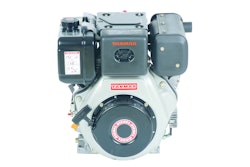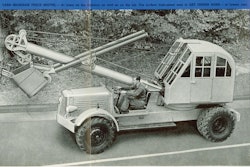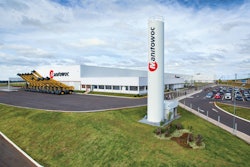“Last year Scania delivered some 61,000 trucks. Our potential on a global basis [for] 2020 will amount to 120,000 trucks per year. Our service sales will also grow and our ambition is for service-related products to represent 25 to 30% of our total sales,” said Scania’s President and CEO Martin Lundstedt at the company’s Capital Markets Day in Södertälje, Sweden on Thursday, September 19 2013.
The potential for buses is 15,000 units and for industrial and marine engines 20,000 units by 2020. Scania’s growth is based on economic activity. Although the next few years may be tough in the European market, Scania expects that European economies will recover in the long term. A significant part of the volume increase by 2020 will come from markets in Asia, Eurasia and Africa.
“We have built a strong position in Europe for the coming years with our broad Euro 6 engine range as well as Scania Streamline and Ecolution by Scania − that is products and services that help lower fuel consumption for our customers and thereby reduce environmental impact. Meanwhile, the trend towards increasing demands for transport efficiency in emerging markets is favourable to us and we are now focusing on expanding our presence further in key segments,” explained Lundstedt.
Focusing on service business
Scania is continuing to develop its service business and strengthen its presence in emerging markets. The rate of investment in the service network in recent years has been about SEK 1 billion annually. Demands from customers for lower fuel consumption and higher vehicle uptime represent great opportunities to boost Scania´s market share on the service side and to broaden its service portfolio.
“Over the past 20 years, we have developed new concepts in the service business, and today, we have a leading position. Now we will increase this volume while increasing our presence in new segments with a large service content. Our ambition is to increase the share of services from 20 to 25% of Scania’s total revenue in recent years to 25 to 30% over an economic cycle,” said Lundstedt.
At the production units, Scania will raise its capacity by investing in advanced processes at existing production units. Scania has begun boosting its technical capacity to 120,000 vehicles, which will represent a total investment of SEK 1.5 billion over a three-year period.
Opportunities with the Volkswagen Group
To further strengthen the product portfolio in the long term and take advantage of economies of scale and skill, Scania has identified opportunities for cooperation with the Volkswagen Group. Scania, together with MAN, is examining areas such as axles, gearboxes, commodities and hybrid drive components. A number of the feasibility studies that have been completed have shown interesting synergy opportunities for Scania and work continues with these opportunities. Furthermore, exchange of knowledge and benchmarking are occurring between the Volkswagen Group and Scania in IT, production and logistics, including working methods and practices.
Since 2008, Scania has had a policy ensuring that any cooperation with related parties is subject to corporate benefit for Scania and is handled according to the arm’s length principle. Lundstedt explained how this policy has formed the basis of the decision making process and workflow, that the company has implemented.
“At the 2014 Annual General Meeting, we will give a summary of the processes implemented at Scania, to safeguard the interests of Scania and all its shareholders in such cooperation projects. The focus will be on how transactions between Scania and related parties are monitored and documented in order to make them auditable,” Lundstedt said.
Scania has also assigned Scania‘s external auditors to pay special attention to these processes, as well as the compliance with them. As earlier communicated, at the 2014 Annual General Meeting, Scania’s auditors will thus comment upon this.
Market situation
Lundstedt also commented on the market situation in the truck segment during the third quarter of 2013.
“There is a replacement need and an interest among customers to invest in Euro 5 trucks before year-end. In light of this, we did not see the normal seasonal downturn in European order bookings during July and August. In Latin America, we had somewhat lower activity compared to the high level of the previous quarters.”














![Hcm Ax Landcros Press Release[32] jpg](https://img.oemoffhighway.com/mindful/acbm/workspaces/default/uploads/2025/11/hcmaxlandcros-press-release32jpg.mAEgsolr89.jpg?ar=16%3A9&auto=format%2Ccompress&fit=crop&h=135&q=70&w=240)




